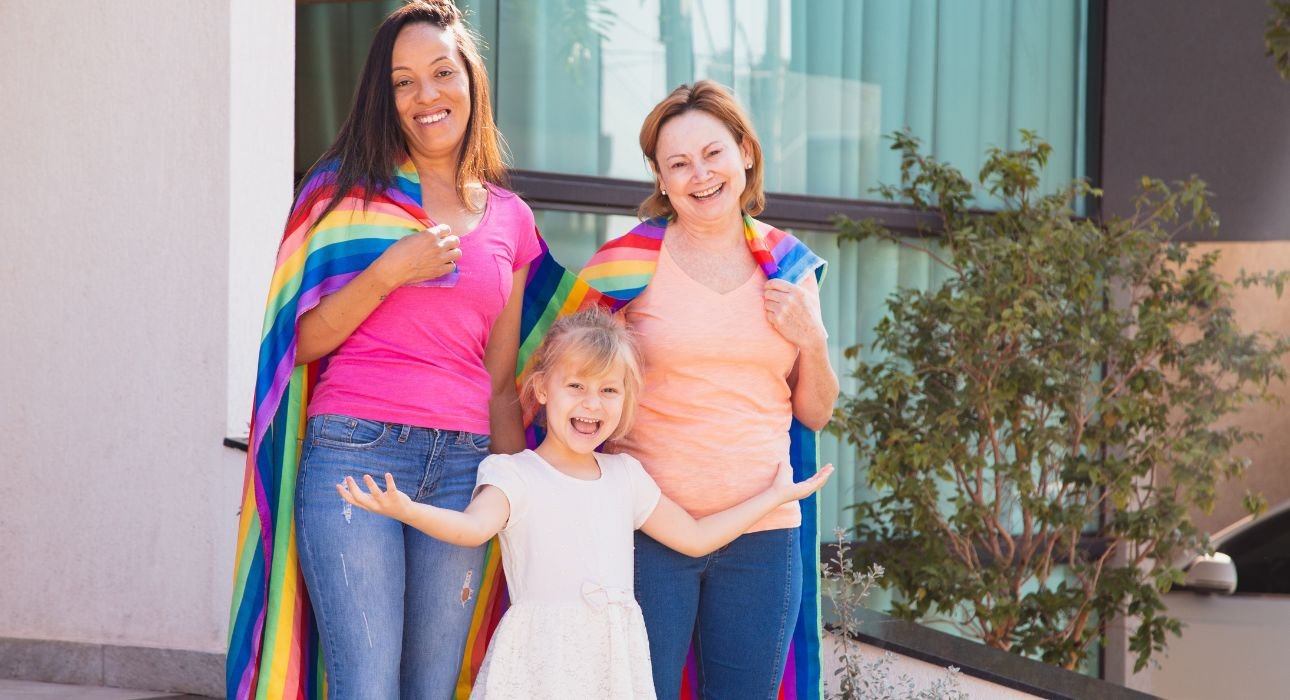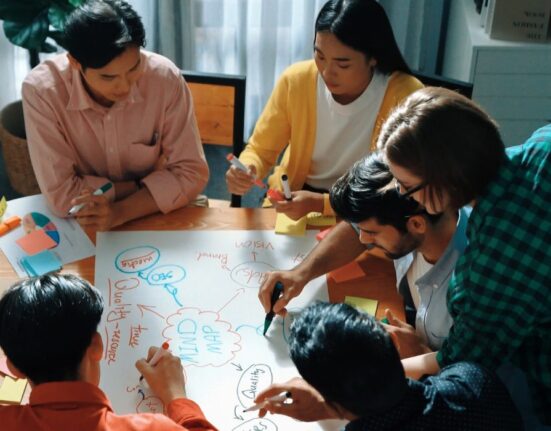The “chosen family” theory, developed by Weston (1991), refers to support systems created by LGBTQ+ individuals that are used as alternative families outside of conventional terms. These chosen families, comprising friends and members of the community, tend to arise due to non-supportive biological families, acting as survival mechanisms and acts of resistance against normalised expectations (Perone et al., 2025). They both emotionally and practically support these individuals, addressing needs frequently left unfulfilled by one’s family of origin (Callaway, 2022, pages 16-20).
Community support involves social networks created within particular collectives, such as geographic LGBTQ+ organizations or peer groups, which create connections between individuals who share similar experiences (Chosen Family Matters – Centerstone, 2025). Community support is essential for the special challenges of transgender individuals.
Minority stress is a phenomenon that explains the increased mental health problems among transgender populations as a result of continued stigma and discrimination. The accumulated stress has a detrimental effect on mental health and is associated with greater mental health problems (Arjee Javellana Restar, PhD et al., 2024). Explaining these mechanisms is central to examining how support from chosen families and the community can reduce minority stress and improve mental health outcomes.
Read More: Mental Health in the LGBTQIA+: A Persistent Concern
Types of Support Available
Emotional support is crucial to the welfare of trans individuals, especially through self-selected families. Findings show that emotional support from such groups promotes safety and security, and it minimizes minority stress (Callaway, 2022, pages 16-20). Trans people depend on such relationships for emotional intimacy to cope with rejection and discrimination from society. Community-based groups that provide peer counseling and peer mentoring assist in affirming experience and enhancing resiliency among trans youth (McCann et al., 2021).
Instrumental aid—like housing support and healthcare advice—is also important. Selected families typically offer this hands-on assistance, relieving everyday burdens on transgender people (Levin et al., 2020). Community health workers play a vital role in connecting gaps in mental healthcare for non-binary and transgender populations (Arjee Javellana Restar, PhD et al., 2024).
Information support provides access to medical choices and entitlements, with educational programs enhancing awareness and tolerance of transgender concerns. Peer support interventions appeal to participants’ own life experiences, promoting feelings of belonging and identity affirmation (Brandon Andrew Robinson, 2024). The interventions have demonstrated significant improvements in mental health outcomes through mutual understanding.
Read More: The Courageous Path of Trans Identity and Self-Acceptance
Mental Health Outcomes
Interactions with selected families greatly improve mental health for transgender people, encouraging welfare and strength. Family and community support serve as a protective shield against minority stressors such as stigma and discrimination (Puckett et al., 2019). Transgender people with positive familial relationships experience lower depression and anxiety levels, higher life satisfaction, and fewer feelings of being a burden (Puckett et al., 2019).
Resilience is crucial in conceptualising these benefits to mental health, whereby resilience is understood as the ability to flourish in the presence of stressors, enabling transgender people to cope successfully with social exclusion (Kantilal et al., 2025). Individuals within supportive social networks have significantly reduced psychological distress. Strategies of coping, like peer support, enable people to cope with societal rejection more effectively (Kantilal et al., 2025).
Critical suicidality reduction is based on those with high chosen family ties. Studies indicate drastic differences; 57% of transgender adolescents from rejecting homes attempt suicide in contrast to 4% from accepting surroundings (Puckett et al., 2019). This highlights the role of social support networks in bolstering mental health among trans people.
Read More: Peer Connections and the Psychology of Belonging in Youth
Mechanisms Affecting Mental Health Outcomes
Social identity’s influence has a profound impact on the mental health of transgender people, serving as protection against minority stress. Confirmation of their identities through chosen families provides a strong sense of belonging, mitigating the detrimental consequences of prejudice and discrimination in society. According to Trujillo et al. (2016), social support lessens psychological distress, bringing emotional stability that is not found in wider society.
Chosen families also allow trans people to participate in mutual care practices that improve their psychological well-being. Levin et al. (2020) highlight that these networks offer synergized support during times of health emergencies, helping build resilience and counter isolation. Through this process, people are able to find help without fear of rejection.
Moreover, community support serves as a resilience buffer against discrimination stressors that transgender persons experience, enhancing coping strategies for mental health. Grigoreva and Szaszkó (2024) indicate that collective resilience can counteract systemic discrimination, optimize the well-being of individuals and creating a space where marginalized identities can grow.
Read More: Be a Peer: Become an Empowered and Responsible First Aider in Mental Health + (ve) Community
Research Methods on Trans Lives and Chosen Families
In studying chosen families and how they affect the mental health of transgender people, different methods are used to hear their stories and provide support systems. Semi-structured qualitative interviews are one of the main approaches, with investigators able to delve into personal accounts in depth. For example, Levin et al. employed interviewing to learn about how Q/T young adults perceive their ‘chosen families’ and the importance these have in overcoming health adversity (Levin et al., 2020). Mutual support and emotional support themes were identified, illustrating how chosen families improve well-being.
Surveys also gauge levels of community support among transgender youth, showing that having supportive family environments does translate into good mental health outcomes among LGBTQ+ youth (Ceatha et al., 2021). This quantitative measurement gauges the levels of supportive relationships.
In addition, systematic and scoping reviews incorporate findings across studies. McCann et al.’s systematic review also pointed out prominent themes like stigma and support sources available that impact transgender people’s psychosocial well-being (McCann et al., 2021). Systematic reviews pinpoint gaps in literature as well as direct future studies towards improving psychosocial support for transgender populations.
Read More: Gender Norms and Self-Concept in India
Moderating Factors in Trans Support and Well-being
The interaction between chosen families, social support from the community, and mental health results is impacted by intersectionality, rejection by one’s family, and accessibility of resources. Intersectionality emphasises the ways multiple identities—race, gender identity, and socioeconomic status—intersect to create diverse experiences of social support.
For LGBTQ youth of colour, these intersecting identities complicate their understanding of family life and belonging (Brandon Andrew Robinson, 2024). Rejection from families can worsen mental health issues; studies indicate that transgender individuals who experience rejection have greater psychological distress than their counterparts with accepting families (Kantilal et al., 2025).
When coping with rejection, strong coping mechanisms are vital, which forces most to seek solace in chosen families or social networks that validate their identities. Moreover, socioeconomic inequalities influence access to such support resources, as economic adversity constrains access to healthcare and erodes hope among transgender people (Kantilal et al., 2025). Consequently, the function of selected families as a support resource is deeply influenced by these factors, emphasising the necessity of personalised interventions for better mental health outcomes.
Read More: Is there Adequate Research on LGBTQIA+ in India?
Gaps, Future Directions & Policy Implications
Substantive lacunae in existing literature on chosen families and mental wellbeing among transgender populations underscore the need for a more layered analysis of intersectional identity and its consequences for support networks. Studies tend to remain deficient, as noted in (Shelton & Lester, 2020), by failing to reflect the intricate dynamics that impact access to mental wellbeing resources, especially for marginalised communities. Future research needs to embrace inclusive methods that capture the heterogeneity of experience, focusing on how different identities intersect and impact mental health outcomes.
Recommendations for future research include longitudinal work that follows the impact of selected families across time and qualitative methods that explore individual narratives. In addition, there is a critical need for targeted intervention programs to address the distinctive stresses of non-binary and other gender-diverse individuals (Grigoreva & Szaszkó, 2024).
At a practical level, policies need to be developed that acknowledge and legitimise alternative forms of support such as chosen families. Healthcare providers must recognise the value of these networks in providing both emotional and functional support (Levin et al., 2020). Laws need to enhance access to mental health care by mandating comprehensive training for providers regarding trans-affirming practices. Strengthening anti-discrimination legislation within healthcare settings will also boost the mental health of transgender people, providing positive environments where chosen families can thrive.
Read More: Paving the Way for Gender-Neutral Parenting and Acceptance in Society
Frequently Asked Questions
Q. What is the “chosen family” theory?
It refers to support systems created by LGBTQ+ individuals as alternative families, often due to non-supportive biological families. These networks provide emotional and practical support, acting as survival mechanisms and resistance against societal norms.
Q. How does “minority stress” affect transgender individuals?
Minority stress explains increased mental health problems among transgender populations due to continuous stigma and discrimination. This accumulated stress negatively impacts mental health, leading to greater psychological distress and associated issues.
Q. What types of support do chosen families and communities offer transgender individuals?
They offer emotional support for safety and intimacy, instrumental aid like housing and healthcare advice, and informational support for medical choices and entitlements. Peer support also fosters belonging and identity affirmation.
Q. How do chosen families impact the mental health of transgender people?
Interactions with chosen families significantly improve mental health by promoting welfare and strength. They act as a protective shield against minority stressors, leading to lower depression, anxiety, and higher life satisfaction.
Q. What role does social identity play in mitigating minority stress?
Confirmation of identity through chosen families provides a strong sense of belonging, mitigating the harmful effects of prejudice and discrimination. Social support lessens psychological distress and brings emotional stability.
Q. What factors influence the effectiveness of chosen family support?
Intersectionality (race, gender, socioeconomic status), family rejection, and resource accessibility significantly influence support effectiveness. Economic adversity can limit healthcare access and erode hope among transgender individuals.
Q. What are the implications for trans-affirming policy and practice?
Policies should legitimize alternative support systems like chosen families. Healthcare providers need comprehensive training in trans-affirming practices, and anti-discrimination legislation should be strengthened to foster supportive environments.
References +
Chavada Vijay Kantilal, Chavada Vijay Kantilal. Shivasakthy Manivasakan. Vasanthy Suresh and Kavita Vasudevan, Shivasakthy Manivasakan, Kavita Vasudevan, Vasanthy Suresh. (2025). Resilience among Transgender Individuals in Puducherry, India: Insights into Mental Well-Being and Social Challenges | IntechOpen. https://www.intechopen.com/online-first/1217491
Chosen Family Matters – Centerstone. (2025). https://centerstone.org/our-resources/health-wellness/chosen-family-matters/
Kenzi J. Callaway. (2022). Financial Socialisation from Chosen and Origin Families: Links to Resource Access and Quality of Life for LGBTQIA Adults. https://conservancy.umn.edu/bitstreams/cc0278c3-1810-4c29-83f4-d6021d65f183/download
Arjee Javellana Restar, PhD. MPH, Kellan Baker, PhD. MPH, Grace Wan,g PhD. MPH, Karen Ashley EdD, April Joy Damian PhD. MSc. (2024). Community Health Workers as Catalysts for Mental Health Promotion in Transgender and Nonbinary Communities. https://ajph.aphapublications.org/doi/full/10.2105/AJPH.2024.307898
Jae A Puckett, Emmie Matsuno, Christina Dyar. (2019). Mental Health and Resilience in Transgender Individuals: What Type of Support Makes a Difference?. https://pmc.ncbi.nlm.nih.gov/articles/PMC7390536/
Edward McCann, Gráinne Donohue, Michael Brown. (2021). Experiences and Perceptions of Trans and Gender Non-Binary People Regarding Their Psychosocial Support Needs: A Systematic Review of the Qualitative Research Evidence. https://www.mdpi.com/1660-4601/18/7/3403
Darja Grigoreva, Bence Szaszkó. (2024). Minority stress and psychological well-being in queer populations. https://www.nature.com/articles/s41598-024-78545-6
Brandon Andrew Robinson.Fei Mu.Javania Michelle Webb.Amy L. Stone. (2024). Intersectional Social Support: Gender, Race, and LGBTQ Youth Friendships – Brandon Andrew Robinson, Fei Mu, Javania Michelle Webb, Amy L. Stone, 2024. https://journals.sagepub.com/doi/10.1177/21568693241266960
Perone. Angela K, Coldon. Tré, Cook. Justice, Toman. Lindsay, Osborne. Ashlee, Glover Reed. Beth. (2025). Aging and Mentorship in the Margins: Multigenerational Knowledge Transfer Among LGBTQ+ Chosen Families. https://academic.oup.com/psychsocgerontology/article/80/6/gbaf027/8016078
Nina Jackson Levin, Shanna K. Kattari, Emily K. Piellusch, Erica Watson. (2020). “We Just Take Care of Each Other”: Navigating ‘Chosen Family’ in the Context of Health, Illness, and the Mutual Provision of Care amongst Queer and Transgender Young Adults. https://www.mdpi.com/1660-4601/17/19/7346
Nina Jackson Levin, Shanna K Kattari, Emily K Piellusch. (2020). “We Just Take Care of Each Other”: Navigating ‘Chosen Family’ in the Context of Health, Illness, and the Mutual Provision of Care amongst Queer and Transgender Young Adults. https://pmc.ncbi.nlm.nih.gov/articles/PMC7579626/
Nerilee Ceatha, Aaron C C Koay, Conor Buggy, Oscar James. (2021). Protective Factors for LGBTI+ Youth Wellbeing: A Scoping Review Underpinned by Recognition Theory. https://pmc.ncbi.nlm.nih.gov/articles/PMC8583439/
Michael A Trujillo, Paul B Perrin, Megan Sutter, Ariella Tabaac, Eric G Benotsch. (2016). The buffering role of social support on the associations among discrimination, mental health, and suicidality in a transgender sample. https://pmc.ncbi.nlm.nih.gov/articles/PMC5996383/
Stephanie Anne Shelton, Aryah O S Lester. (2020). A narrative exploration of the importance of intersectionality in a Black trans woman’s mental health experiences. https://pmc.ncbi.nlm.nih.gov/articles/PMC8986210/













Leave feedback about this